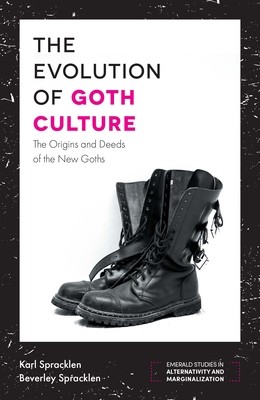
- We will send in 10–14 business days.
- Author: Karl Spracklen
- Publisher: Emerald Publishing Limited
- ISBN-10: 1787146774
- ISBN-13: 9781787146778
- Format: 15.5 x 22.9 x 1.8 cm, hardcover
- Language: English
- SAVE -10% with code: EXTRA
Reviews
Description
The origins and deeds of the old Goths were constructed by Roman historians in fear of the Goth as a barbarian outsider; at the same time, the Goths were themselves the heroic subject of their own histories, constructed by their supporters as stories of their mythical origin and the deeds that led them to be rulers of their own kingdoms in post-Roman Late Antiquity. Who the old Goths were, their origins and their deeds, was a product of history, historiography and myth-making.
In this book, Spracklen and Spracklen use the idea of collective memory to explore the controversies and boundary-making surrounding the genesis and progression of the modern gothic alternative culture. Spracklen and Spracklen argue that goth as sub-culture in the eighties was initially counter cultural, political and driven by a musical identity that emerged from punk. However, as goth music globalised and became another form of pop and rock music, goth in the nineties retreated into an alternative sub-culture based primarily on style and a sense of transgression and profanity. By this century goth became the focus of teenage rebellions, moral panics and growing commodification of counter-cultural resistance, so that by the goth has effectively become another fashion choice in the late-modern hyper-real shopping malls, devoid generally of resistance and politics.
Goth, like punk, is in danger of being co-opted altogether by capitalism. This book suggests that the only way for goth culture to survive is if it becomes transgressive and radical again.
EXTRA 10 % discount with code: EXTRA
The promotion ends in 20d.20:09:40
The discount code is valid when purchasing from 10 €. Discounts do not stack.
- Author: Karl Spracklen
- Publisher: Emerald Publishing Limited
- ISBN-10: 1787146774
- ISBN-13: 9781787146778
- Format: 15.5 x 22.9 x 1.8 cm, hardcover
- Language: English English
The origins and deeds of the old Goths were constructed by Roman historians in fear of the Goth as a barbarian outsider; at the same time, the Goths were themselves the heroic subject of their own histories, constructed by their supporters as stories of their mythical origin and the deeds that led them to be rulers of their own kingdoms in post-Roman Late Antiquity. Who the old Goths were, their origins and their deeds, was a product of history, historiography and myth-making.
In this book, Spracklen and Spracklen use the idea of collective memory to explore the controversies and boundary-making surrounding the genesis and progression of the modern gothic alternative culture. Spracklen and Spracklen argue that goth as sub-culture in the eighties was initially counter cultural, political and driven by a musical identity that emerged from punk. However, as goth music globalised and became another form of pop and rock music, goth in the nineties retreated into an alternative sub-culture based primarily on style and a sense of transgression and profanity. By this century goth became the focus of teenage rebellions, moral panics and growing commodification of counter-cultural resistance, so that by the goth has effectively become another fashion choice in the late-modern hyper-real shopping malls, devoid generally of resistance and politics.
Goth, like punk, is in danger of being co-opted altogether by capitalism. This book suggests that the only way for goth culture to survive is if it becomes transgressive and radical again.


Reviews